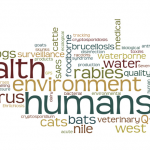
Considering these evidences of improving human and animal health, the American Veterinary Medical Association (AVMA) executive board established an official action to organize some activities under the One Health approach. So, after a meeting on April 14, 2007, AVMA organized the One Health Initiative Task Force (OHITF), in order to study the feasibility of a campaign to facilitate collaboration and cooperation among health sciences professions, academic institutions, governmental agencies, and industries. This collaborative approach would have the main goal of proper evaluation, treatment and preventive activities concerning animal and human common diseases. The OHITF proposed recommendations and strategic activities that would spread the One Health concept among the health professionals. Such activities are mainly based on the collaboration between distinct and related areas to veterinary medicine profession: public health, human medicine, animal science, environmental science, wildlife. As a result of the work together between such areas, an obvious improving of the worldwide health can be achieved.
During a meeting promoted by the National Center for Emerging and Zoonotic Infectious Diseases, from CDC, under the theme “Operationalizing One Health: a policy perspective – taking stock and shaping an implementation roadmap”2, it was identified that one of the main concerns is the proper training of professionals, in order to develop skills, expertise, and competencies. A possible result of such discussion would be the interaction between scientific and academic institutes and universities in order to propose an integrated curriculum for health related areas professions, aiming the formation of professionals with the global view of One Health approach, supposable able to integrate all issues concerning a specific health theme, and propose rational solutions based on their holistic knowledge.
Based on this overview, the interactions between scientific groups from distinct countries, with distinct health realities, would be a particularly interesting experience for such professionals. This kind of training would be a challenge for universities and scientific institutes, considering the possible limitations between distinct academic structure from participating countries and schools; however, the globalization reality that is currently worldwide spread must be considered in such agreements, mainly considering the purpose of promoting an improvement of the human health through the One Health approach. A professional with such training would be allowed to deal properly with relevant health issues worldwide, and would support the assessment and elucidation of health problems characterized by a diversity of particularities.
